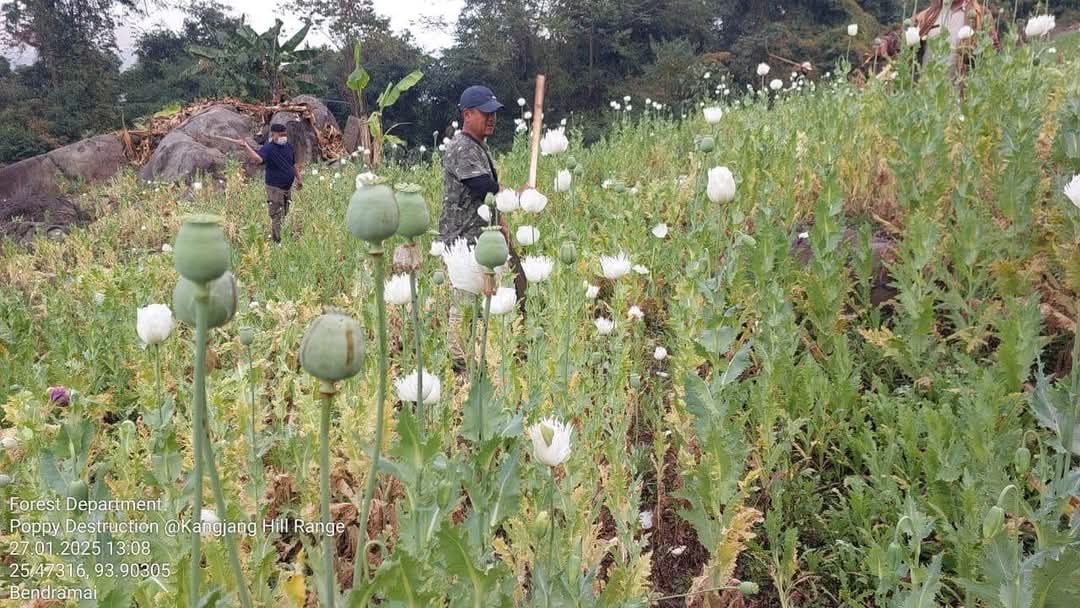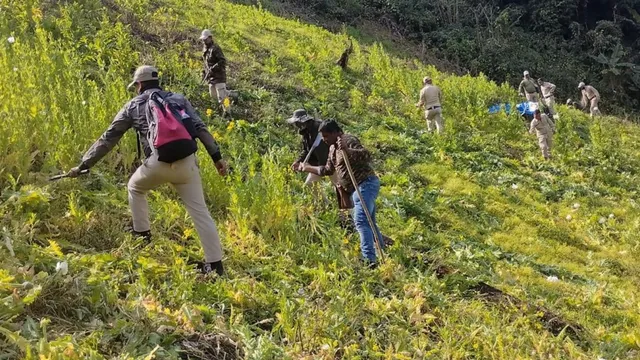Manipur’s Ongoing Battle Against Illicit Poppy Cultivation: A Closer Look at Recent Developments
Summary of the News Article
In a significant move against illegal drug cultivation, a joint team comprising the Senapati Police, Forest Department, and District Administration successfully eradicated 4.8 hectares of illicit poppy plantations in the Kangjang Hills of Senapati district. Chief Minister N. Biren Singh commended the team’s dedication, emphasizing that the fight against drugs is a collective responsibility.
Understanding the Issue: Poppy Cultivation in Manipur
Manipur, a state rich in cultural diversity and natural beauty, has long grappled with the challenge of illicit poppy cultivation. The poppy plant, primarily cultivated for its opium latex, serves as the raw material for heroin production. The proliferation of poppy fields has not only fueled the drug trade but also posed significant health and social risks to the local population.
The Recent Operation: A Strategic Approach
The recent operation in the Kangjang Hills was a collaborative effort involving multiple agencies. This joint task force meticulously identified and destroyed the illicit poppy fields, sending a strong message to those involved in the drug trade. Such coordinated actions are crucial in dismantling the networks that perpetuate drug-related activities in the region.
Chief Minister’s Perspective
Chief Minister N. Biren Singh’s commendation highlights the importance of collective action in combating drug-related issues. His statement underscores the government’s commitment to creating a drug-free environment, which is essential for the overall well-being and prosperity of Manipur.
The Broader Implications
The eradication of 4.8 hectares of poppy cultivation is a significant achievement. However, it is essential to recognize that this is part of a larger, ongoing battle against drug production and trafficking. Sustained efforts, including community engagement, awareness programs, and alternative livelihood options for farmers, are necessary to address the root causes of illicit cultivation.
Challenges Ahead
Despite these commendable efforts, challenges remain. The porous borders of Manipur facilitate the smuggling of narcotics, and the economic incentives for farmers to engage in poppy cultivation are substantial. Addressing these challenges requires a multifaceted approach, including strengthening border security, providing economic alternatives to farmers, and enhancing public awareness about the dangers of drug abuse.
Conclusion
Manipur’s fight against illicit poppy cultivation is a testament to the state’s commitment to eradicating drug-related issues. While significant strides have been made, continuous efforts are essential to ensure a healthier and more prosperous future for the people of Manipur.
FAQs
- What is the significance of the recent operation in Kangjang Hills?The operation led to the destruction of 4.8 hectares of illicit poppy cultivation, marking a significant step in Manipur’s fight against drug production.
- Who were involved in the joint operation?The operation was carried out by a team comprising the Senapati Police, Forest Department, and District Administration.
- What did Chief Minister N. Biren Singh say about the operation?He commended the teams for their dedication and emphasized that the fight against drugs is a collective responsibility.
- What challenges remain in combating illicit poppy cultivation in Manipur?Challenges include porous borders facilitating smuggling, economic incentives for farmers to cultivate poppy, and the need for sustained community engagement and alternative livelihood options.
- How can the community contribute to the fight against drug cultivation?Community involvement in awareness programs, reporting illicit activities, and supporting alternative livelihoods for farmers are crucial in combating drug cultivation.




